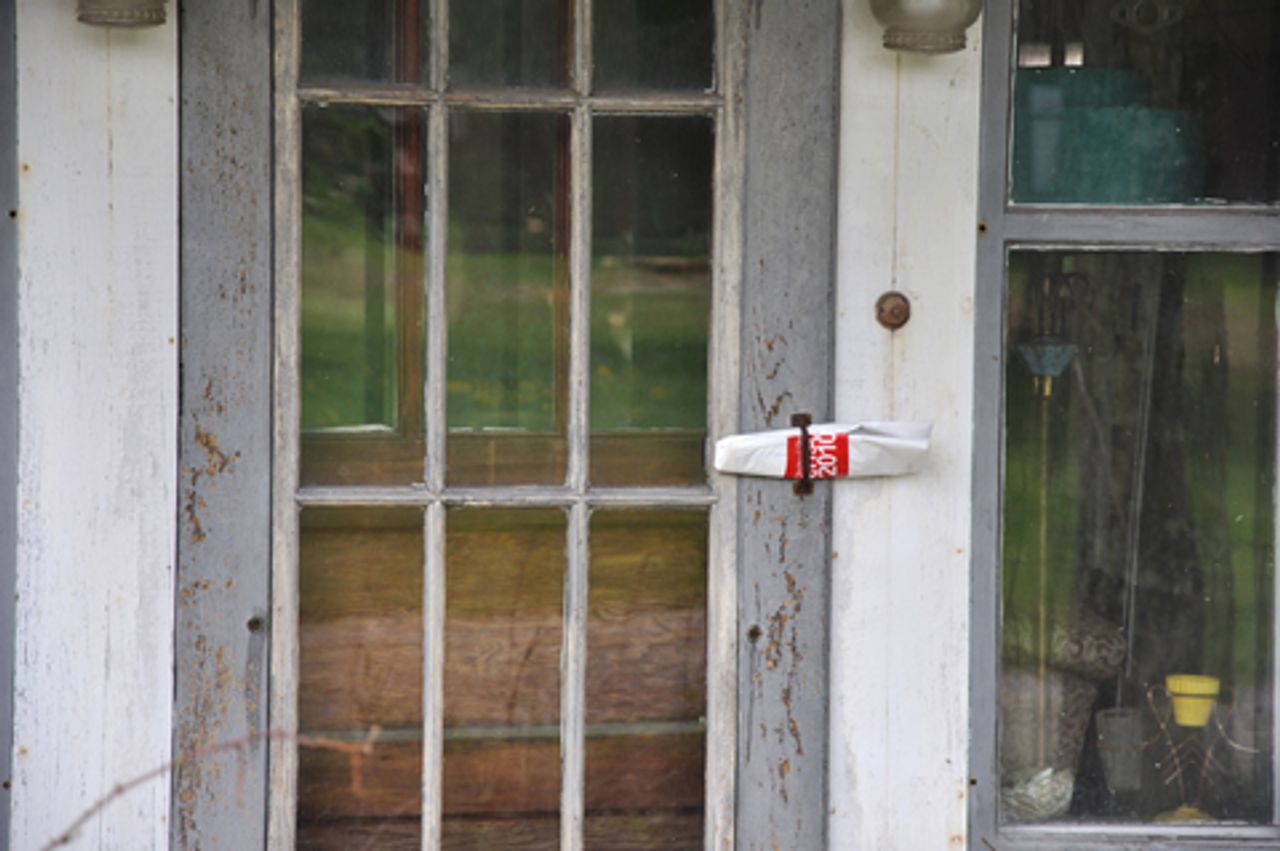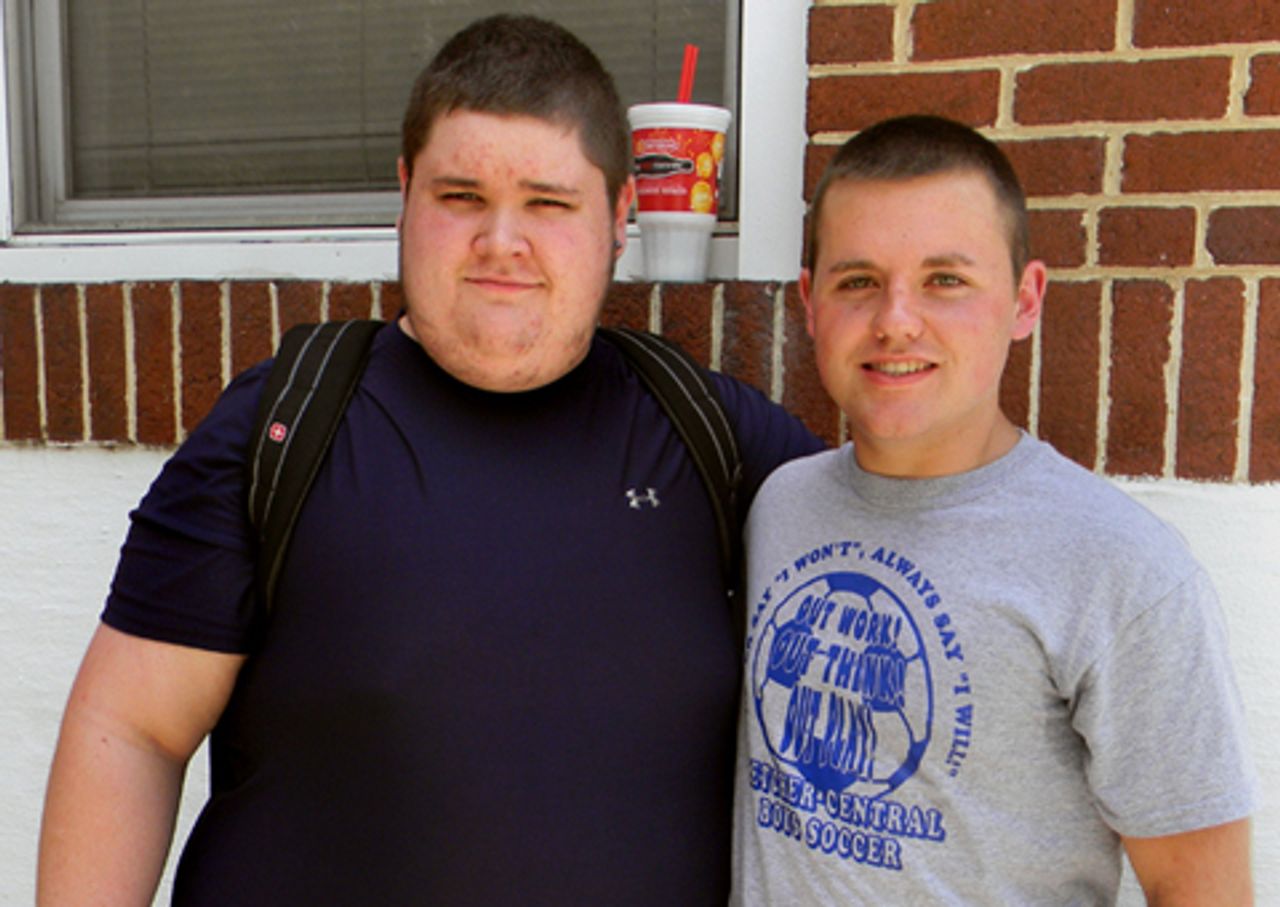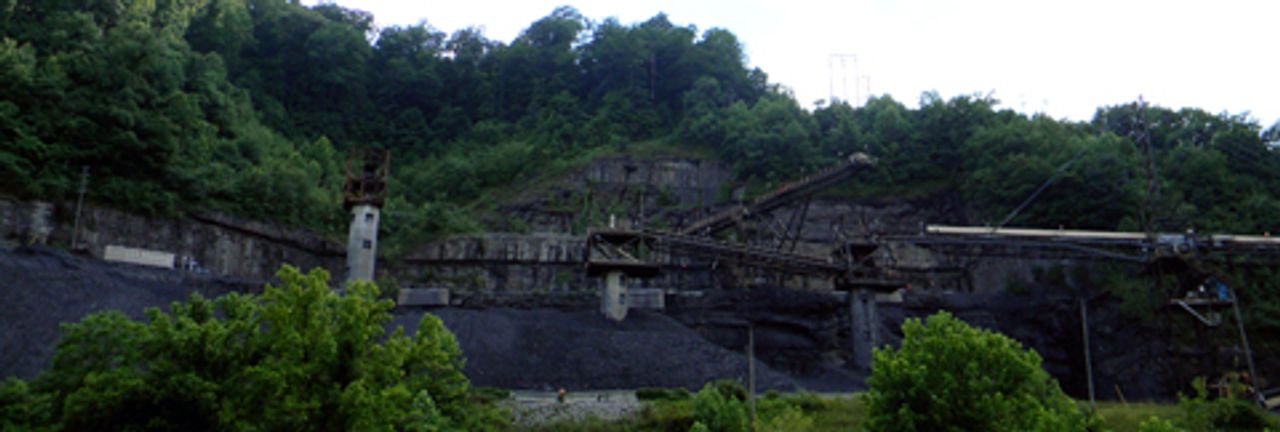By Naomi Spencer
This article is the fourth of a series on the history, economy, social and environmental conditions in the Appalachian region of the United States. Part 1 was published on July 22, part 2 on July 24, and part 3 on July 27. World Socialist Web Site reporters recently visited the coalfields of southeastern Kentucky and southwestern West Virginia and interviewed residents on their conditions of life. Accompanying interviews are posted in four parts here: 1 | 2 | 3 | 4.
 A vacant home in West Virginia
A vacant home in West VirginiaThe population of the coalfields region of eastern Kentucky and southwestern West Virginia has hemorrhaged with the collapse of wages and jobs in the coal industry since the 1980s. At its peak in the mid-1970s, coinciding with a coal boom and an upsurge in militant strikes, the coalfields region experienced a population increase of 21 percent, more than double the national average growth rate, to more than 2.3 million residents.
The 1980s, however, signaled a devastating and international counteroffensive of capital against the working class. In central Appalachia, the coal companies, aided by the betrayals of the United Mine Workers and other unions against the workforce, succeeded in isolating strikes, forcing out the most militant workers, and replacing large sections of the workforce with machines manned by much smaller, highly exploited crews. Mining towns that at one time bustled with commerce and thousands of residents have stagnated and decayed.
In the 1980s, coalfields counties lost nearly 100,000 residents. Between 1990 and 2000, coal-intensive counties lost another 10 percent of their population, a trend that has continued in the decade since the last US Census.
Young people and working class families are compelled to leave the region in search of livable wages and educational opportunities. This out-migration in turn further exacerbates the dearth of specialized medical, educational and other professional service providers.
The poorest youth find few options after school, centered on low-wage jobs, military enlistment, or mining and logging industries. Even in the retail sector, young people are faced with intense competition over jobs, including with older workers who have lost higher wage jobs in the course of the recession. In West Virginia, the number of unemployed workers doubled in 2009, according to the state Center on Budget and Policy. Over 25,000 jobs were cut, many of them in the better-paying manufacturing sector. In already distressed coalfields counties, the poverty rate for children is more than one in three, and young adults also bear a disproportionately high and rising poverty and unemployment rate.
World Socialist Web Site correspondents interviewed young people in the area about social conditions and employment prospects. Many expressed concern over access to quality education and the economic decay of the region. Residents also voiced their concerns over the management of the environment, many of them drawing parallels between the plight of Appalachia and the still unfolding disaster in the Gulf of Mexico.
 Miranda
MirandaMiranda Kohari, a 22-year-old Chatteroy, West Virginia, resident, works part-time at the Righteous Brew coffee shop in Williamson. She is a first-year nursing student at Pikeville College, a 45-minute commute from home. “I started out as an education major,” she told the WSWS. “I switched to the nursing program for the job security. I thought you can go anywhere as an RN.
“I don’t have student loans—I am really lucky. I won a scholarship the year I was born because I was the first baby born in the maternity ward of the Pikeville hospital. Without that, there is no way I could have gone to school. I’m still living at home with my family. I wouldn’t be able to afford to live on my own; I work part-time at the coffee shop, which if you aren’t in coal, it’s the only kind of work you can find.
“I really wanted to be a teacher,” Miranda said. “But the schools are being cut and education isn’t a steady career path anymore. There are a few teachers in my family and they’ve been laid off. This was really devastating. Here, the Williamson high school is going to close and be consolidated with Matewan and Birch. I love this town, and I really hate to see it collapse.
“When the economy is collapsing, there’s nowhere for people to go,” she told the WSWS. “Some of the young people attend Southern West Virginia Community College, but the majority go away and don’t come back. A lot of businesses have relocated across the river in Kentucky, and people drive down to Pikeville to do their shopping. The economy here is worsening because of that, and because of the broader economy. Three or four different businesses in the shop down the street have opened and folded in the last couple of months.”
Like many residents, Miranda sees the dangers and destructiveness of mining primarily as a consequence of reckless management. “My whole family has always been in the coal business,” she explained. “I don’t want to see the environment destroyed. But I’d rather them get the coal from up top of the mountains somehow than underground, because it is so dangerous. The Gulf disaster really disturbs and upsets me. It is a similar issue. I am very concerned about the ecology, and the wildlife and what the impact of that oil is going to have on all of us.”
Rick Lucas, a Pikeville resident, is a business major at Pikeville College with an emphasis in accounting. “Around here the coal industry is dominant. There are better ways of doing it,” he said. “My father is the owner of a contract mine on Black Mountain. The problem is that big coal companies don’t want to do things the right way.
 Rick (left) and Steven
Rick (left) and Steven“The US was once the strongest economy in the world. It’s fallen so far. In the 1950s and 1960s, the country was prospering. But now it’s collapsed,” he noted.
Rick told the WSWS that he lives at home with his parents, who help him cover tuition costs not covered by some scholarships. He also works part-time as a sales associate at a local pharmacy for minimum wage. “I have a few bills, but it would be a real struggle if I had to live on my own.”
Rick’s friend, Steven Wright, is a 19-year-old junior at the University of Kentucky in Lexington and a native of the unincorporated Pike County community of Virgie. A mechanical engineering major, he said he is able to attend school with the help of a federal Pell Grant and a Smart Grant, the federal grant program for science studies.
Steven described his parents as hardworking: “My mom is a teacher’s aide. My dad worked in a coal mine, but he stopped when he developed stage 1 black lung. Now he works for a construction company under a private contract, with a wage of around $15 an hour. When he gets a state contract, the wages are higher, $20 to $25 an hour.” Steven said his family has trouble with health insurance costs, and his parents help to pay for his university tuition.
Describing the limited opportunities for young people in the region, he told the WSWS, “If you go to high school here, you typically go into mining or the military. I’ve heard my high school, Shelby Valley, is the number-one military recruiting school in the state. They don’t prepare kids enough for college. It’s really behind in curriculum; they just started offering AP [advanced placement—college prep classes] a few years ago. When I graduated, AP calculus was not offered.
“There are not a lot of majors available at Pikeville College,” he said. “There is a narrow focus on business and a few other vocations and not a lot in terms of broad education. People kind of feel restricted. They’ve got a good school for medicine. Everybody can’t be a business major.”
A self-described Republican, Steven told the WSWS that the Republican right did not represent his interests. “Fox News has gotten ridiculous. I don’t watch anything on television anymore. I like to read articles online that provide content.”
Steven expressed outrage over the Gulf oil disaster. “I want to know why a whole month passed before they even tried capping the oil well leak. Why is BP still in charge? It could have been handled a lot better—they’ve done nothing but slide past everything, and Obama has let this go on. He can say things about how he’s going to kick some asses, but he’s a better ass kisser than an ass kicker.
“There should be more people working on it, scientists, engineers. I’m sick of the idea of ‘quick fixes.’ What is a ‘quick fix’ for a catastrophe? From an engineering perspective, this never should have happened in the first place.
“I love the idea of alternative energy. There are other ways to power cars; there are rechargeable batteries that you never have to throw away and that don’t have any of the toxic chemicals that currently leach into the soil. Why should BP control so much money, to pursue oil?
“We should put our best scientific minds to nanotechnology. We could employ nanotechnology in fixing the Gulf, and to bettering other energy production. The first person who can come up with a nanobot to go down into the mines and extract coal—! Why should miners go down there, risk their lives, get sick? They already have these innovations in the medical fields.
“But innovations are so slow in development,” he added, indicating that profit interests were acting as a drag on science. “It typically takes two or three decades for an innovation to be fully implemented. Why? Because you can’t make billions of dollars from it right off the bat. We need to have some regulation.”
Heather Jordan, a 16-year-old high school student from Wyoming County, West Virginia, told WSWS reporters she worried about the limited prospects for her and her peers. “I want to study nuclear medicine when I go to college,” she said. “Science is so important. I know someone who works as a radiologist, and I thought this was an interesting field.”
“But I probably will have to go away to find a program and a job,” Heather said. “Where I’m from, most people are low income, with lower living standards. A lot of my friends are on free and reduced price lunch, and their families are poor. There’s been a gradual loss of jobs for a long time because of the changes in the coal industry,” she said, “but a lot of jobs are being lost to the recession too.”
 Ann
AnnAnn Francis, a 20-year-old junior in music education at Morehead State University (MSU) and a native of Pikeville, Kentucky, spoke to the WSWS at Pikeville College, where she is employed for the summer. She mentors working class high school students aspiring to go on to college.
Ann graduated high school in Pikeville before attending MSU, about 90 miles to the north. “A lot of people leave this area when they graduate, or say they want to leave when they get out of school,” she said, “but they end up working here after all.”
Like university students all around the country, Ann has seen double-digit tuition increases every year. “I have scholarships and haven’t had to take out any loans,” she said, but added that the scholarships will not cover the fifth year of school she will have to attend in order to complete her degree. “I don’t know how I’ll pay for tuition after they run out.”
At MSU, she said, “They have tacked a lot of extra fees since tuition cannot be raised more than a certain amount.” Ann said her scholarships do not cover the newly imposed $90 “music fee,” and Internet classes—which are increasingly replacing traditional general education courses—now cost an additional $300. She has worked minimum wage federal work studies on campus to help offset these costs.
 Chris
ChrisChris Hollis, a 21-year-old Pikeville College graduate, just received a degree in business administration and management. He is working temporarily at the university. “I went home to Columbus [Ohio] to try to find a summer job, but there weren’t any. I applied, but no one’s calling me back. I have a job here for the month, but after that, I don’t have any plans.
“I have some private student loans, not as much as some people,” he said. “But the payments kick in in November. I hope I can find a decent job by that time. I don’t want that debt lingering over my head for a long time.”
Asked what young people did for entertainment in Pikeville, Chris said, “I was on the bowling team in college. Kids can go bowling, or go to a movie. Some kids here just go hang out in the Wal-Mart parking lot.”
To be continued
Part 1 | Part 2 | Part 3
Interviews: 1 | 2 | 3 | 4
30 July 2010




